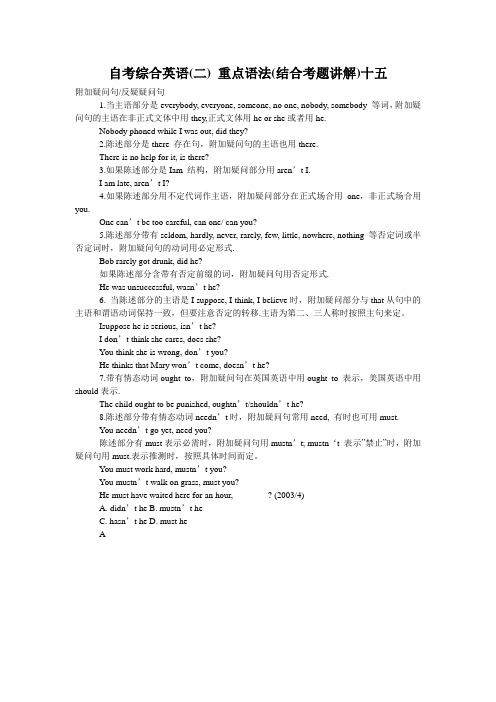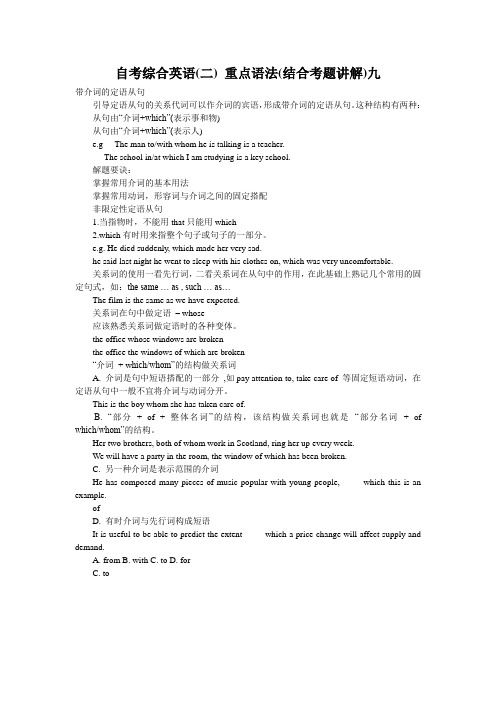英语学习之自考综合英语二语法总结
综合英语(2)语法知识点

综合英语(2) 语法知识点Unit One反意疑问句1)陈述部分的主语是I,疑问部分要用aren't I.I'm as tall as your sister,aren't I?2)陈述部分的谓语是wish,疑问部分要用may +主语。
I wish to have a word with you, may I?3)陈述部分用no, nothing, nobody, never, few, seldom, hardly, rarely, little等否定含义的词时,疑问部分用肯定含义。
The Swede made no answer, did he / she?Some plants never blown (开花), do they ?4)含有ought to 的反意疑问句,陈述部分是肯定的,疑问部分用shouldn't / oughtn't +主语。
He ought to know what to do, oughtn't he? / shouldn't he?5)陈述部分有have to +v. (had to + v.),疑问部分常用don't +主语(didn't +主语)。
We have to get there at eight tomorrow, don't we?6)陈述部分的谓语是used to 时,疑问部分用didn't +主语或usedn't +主语。
He used to take pictures there, didn't he? / usedn't he?7)陈述部分有had better + v. 疑问句部分用hadn't you?You'd better read it by yourself, hadn't you?8)陈述部分有would rather +v.,疑问部分多用wouldn't +主语。
自考综合英语(二) 重点语法(结合考题讲解)六

自考综合英语(二) 重点语法(结合考题讲解)六语态主动形式表示被动含义:A. need/require/want/deserve doing= need/require/want/deserve to be doneB. smell /sound /taste /feel /prove +adj.The story proved quite false.The flowers smell sweet.C. Can’t, won’t…+vi. (move, lock, open,…)The door won’t shut.D. read, write, wash, clean, draw, burn, cook, wear…+adv. (well, easily….)下面请看几个例子:This kind of rice cooks more quickly.The cloth washes easily.His blue jeans have worn thin.还要注意一些主动形式表示被动含义的短语:Be to blame: be responsible fordon’t know who is to blame.sink in: be understoodcome out: be published重点短语:have/has sth. done (考试中出现的频率极高) 该短语有三个意思:(1)请/让某人做某事I will have my hair cut tomorrow.He has just had his bicycle repaired.(2)某物遭受到某一消极动作He had his finger burnt yesterday.He had his face cut when he was shaving his face.(3)主语本身做某事We’ll have all the dishes cleared away before seven p.m. every day.国考中主要考前两个意思。
自考综合英语(二) 重点语法(结合考题讲解)二

自考综合英语(二) 重点语法(结合考题讲解)二形容词和副词以下情况形容词常用于后置定语:1) 一些表语性形容词要后置,如:present (到场的,出席的) ,available ,involved ,concerned ,etc 。
2) 形容词修饰不定代词something ,anything ,everything 时要后置。
例如:There was something wrong with her.I came across a tricky question hard to answer.I wondered if there was a room available.注意enough的位置:enough 修饰名词时放在名词前后均可,修饰形容词或副词时要放在后面。
如:enough water /water enoughcareful enough/ well enough形容词和副词的原级比力由“as + 形容词或副词原级( 或后跟名词或短语)+as” 构成,“as…as” 前可加not ,just ,almost ,nearly ,quite ,twice ,several times 等词修饰。
否定式中not 后面的as 可改为so 。
如:He is as tall as I.He is not as/as careful as his brother.形容词与副词的比力级形式为:“ 形容词( 副词) 比力级+than+…” ,应注意than 前后比拟较的人或物要一致(不然没有可比性)。
比力级前可以跟even ,much ,stilI, far, a lot 等副词修饰比力级,表示强调。
You voice is more beautiful than your classmates’/that of your classmates.The population in China is much larger than that in America.The values of the young differ from those of their elders. 不成数名词或名词单数,后面用that代替,可数名词复数后面用those代替。
自考综合英语(二) 重点语法(结合考题讲解)十五

自考综合英语(二) 重点语法(结合考题讲解)十五附加疑问句/反疑疑问句1.当主语部分是everybody, everyone, someone, no one, nobody, somebody 等词,附加疑问句的主语在非正式文体中用they,正式文体用he or she或者用he.Nobody phoned while I was out, did they?2.陈述部分是there 存在句,附加疑问句的主语也用there.There is no help for it, is there?3.如果陈述部分是Iam 结构,附加疑问部分用aren’t I.I am late, aren’t I?4.如果陈述部分用不定代词作主语,附加疑问部分在正式场合用one,非正式场合用you.One can’t be too careful, can one/ can you?5.陈述部分带有seldom, hardly, never, rarely, few, little, nowhere, nothing 等否定词或半否定词时,附加疑问句的动词用必定形式.Bob rarely got drunk, did he?如果陈述部分含带有否定前缀的词,附加疑问句用否定形式.He was unsuccessful, wasn’t he?6. 当陈述部分的主语是I suppose, I think, I believe时,附加疑问部分与that从句中的主语和谓语动词保持一致,但要注意否定的转移.主语为第二、三人称时按照主句来定。
Isuppose he is serious, isn’t he?I don’t think she cares, does she?You think she is wrong, don’t you?He thinks that Mary won’t come, doesn’t he?7.带有情态动词ought to,附加疑问句在英国英语中用ought to 表示,美国英语中用should表示.The child ought to be punished, oughtn’t/shouldn’t he?8.陈述部分带有情态动词needn’t时,附加疑问句常用need, 有时也可用must.You needn’t go yet, need you?陈述部分有must表示必需时,附加疑问句用mustn’t; mustn‘t 表示”禁止”时,附加疑问句用must.表示推测时,按照具体时间而定。
自考英语二(课堂笔记_语法部分)

综合英语二(课堂笔记_语法部分)一、谓语动词It is + adj. + to do /for to do主语+ 系动词+ to doabout to dogoing to doI have nothing to do but read the novel.but——但是,可以+不定式,前有“do”后无“to”抽象名词/chance/way/power/ability/opportunity/promise/capacity/occasionTo match up with others, we must study harder.We should study harder to catch up with others.句首有逗号,译为“为了”,句末无逗号,译为“以便”The reason given was that the acid in the orange juice would make the milk curdle and become indigestible.Only 25 percent of all diamonds mined are good enough for cutting into gems.Work together to control the amount of violent programs watched and the number of violent toys found in the home.First, we find that the number depends, of course, on the items involved.1、动词不定式、现在分词、动名词、过去分词作表语的区别。
We are to study current science.He is to do the experiment in physics.不定式作表语表示将来的行为。
自考英语二语法知识点

自考英语二语法知识点(经典版)编制人:__________________审核人:__________________审批人:__________________编制单位:__________________编制时间:____年____月____日序言下载提示:该文档是本店铺精心编制而成的,希望大家下载后,能够帮助大家解决实际问题。
文档下载后可定制修改,请根据实际需要进行调整和使用,谢谢!并且,本店铺为大家提供各种类型的经典范文,如工作报告、工作计划、活动方案、规章制度、演讲致辞、合同协议、条据文书、教学资料、作文大全、其他范文等等,想了解不同范文格式和写法,敬请关注!Download tips: This document is carefully compiled by this editor. I hope that after you download it, it can help you solve practical problems. The document can be customized and modified after downloading, please adjust and use it according to actual needs, thank you!Moreover, our store provides various types of classic sample essays, such as work reports, work plans, activity plans, rules and regulations, speeches, contract agreements, documentary evidence, teaching materials, complete essays, and other sample essays. If you would like to learn about different sample formats and writing methods, please pay attention!自考英语二语法知识点嘿,同学们晓得吧?其实,水滴石穿,绳锯木断。
自考综合英语(二) 重点语法(结合考题讲解)二十四

自考综合英语(二) 重点语法(结合考题讲解)二十四动名词重要句型:It’s/There’s no use/no good doing …It is worthwhile doing …There is no point in doing …做…… 是没有意义的。
接动名词作宾语的动词admit, avoid, delay, deny, enjoy, escape, finish, appreciate, consider, mind, risk, practise, dislike, resent(怨恨), advise, pardon, require, quit (戒除), suggest有些动词后既可以跟动名词,也可以跟不定式like, love, start, continue, attempt, propose, forget, recall, endure, permit, deserve, regret, omit (疏忽,省略)etc.to作为介词的短语be used to,be accustomed to,be opposed to 反对,be addicted to沉溺于,be devoted to专心于,look forward toobject tosee to 负责,留意动词need, require, want, deserve后面跟动名词的主动形式表示被动意义。
All the cars in the yard need repairing.I think that a man like him deserves looking up to.动名词作宾语与不定式作宾语的区别1)plan, like, love, hate后动名词表示抽象行为和一般动作,不定式表示具体的、特定的动作。
He likes dancing but he doesn’t like to dance with strangers.2)意义不同大的动词:rememberdoingto do记得做过某事记得要做某事forgetdoingto do做过某事但忘记了忘记去做某事regretdoingto do对做过的事遗憾对将要做的事遗憾meandoingto do意味着,意思是想要trydoingto do试着做努力做go ondoingto do继续做本来没做完的事继而做另一件事。
自考综合英语(二) 重点语法(结合考题讲解)九

自考综合英语(二) 重点语法(结合考题讲解)九带介词的定语从句引导定语从句的关系代词可以作介词的宾语,形成带介词的定语从句。
这种结构有两种:从句由“介词+which”(表示事和物)从句由“介词+which”(表示人)e.g----The man to/with whom he is talking is a teacher.----The school in/at which I am studying is a key school.解题要诀:掌握常用介词的基本用法掌握常用动词,形容词与介词之间的固定搭配非限定性定语从句1.当指物时,不能用that只能用which2.which有时用来指整个句子或句子的一部分。
e.g. He died suddenly, which made her very sad.he said last night he went to sleep with his clothes on, which was very uncomfortable.关系词的使用一看先行词,二看关系词在从句中的作用,在此基础上熟记几个常用的固定句式,如:the same … as , such … as…The film is the same as we have expected.关系词在句中做定语– whose应该熟悉关系词做定语时的各种变体。
the office whose windows are brokenthe office the windows of which are broken“介词+ w hich/whom”的结构做关系词A. 介词是句中短语搭配的一部分,如pay attention to, take care of 等固定短语动词,在定语从句中一般不宜将介词与动词分开。
This is the boy whom she has taken care of.B. “部分+ of + 整体名词”的结构,该结构做关系词也就是“部分名词+ of which/whom”的结构。
- 1、下载文档前请自行甄别文档内容的完整性,平台不提供额外的编辑、内容补充、找答案等附加服务。
- 2、"仅部分预览"的文档,不可在线预览部分如存在完整性等问题,可反馈申请退款(可完整预览的文档不适用该条件!)。
- 3、如文档侵犯您的权益,请联系客服反馈,我们会尽快为您处理(人工客服工作时间:9:00-18:30)。
最牛英语口语培训模式:躺在家里练口语,全程外教一对一,三个月畅谈无阻!太平洋英语,免费体验全部外教一对一课程:英语学习之自考综合英语二语法总结一、语法 Grammar & UsageSubject-Verb Agreement (I)1.主谓一致的三条原则1)语法一致,即在语法形式上取得一致。
Human beings enjoy learning.Everybody’s understanding is incomplete.2)意义一致,即根据意义来处理一致关系。
The people there are fighting for the independence of their country.The dollars was a lot of money at that time.3)就近原则,即谓语动词的单、复数形式取决于最靠近它的词语。
There is a pen, two pencils and an eraser in the pencil box.Neither the boy nor his teachers know the answer.2.集体名词作主语时与动词的一致1)当主语为furniture, equipment, machinery等词时,谓语动词通常用单数。
The furniture in that shop is all made in China.Office equipment is very expensive nowadays.A lot of new machinery has been installed.集体名词如people, cattle, police, poultry,等往往作复数用。
Some people drive madly in this country.Many cattle have died because of the fold.The police have been sent there but they have not made any arrests yet.Poultry are plentiful in that mountain region.family, government, class, committee, audience , team, public 等词被视做一个整体时,其后的动词作单数;被视做为构成整体的个体时,其后的动词则为复数。
His family is a happy one.His family are all interested in stamp-collecting.The Democratic Government is in power now.The government is/are considering further tax cuts.The audience was very quite when he was giving his speech.The audience were shouting and laughing when he came into the hall.Our class is the top class in the grade.The class are busy taking notes.3.并列主语与动词的一致1)当“名词+名词”表示一种事物时,用单数动词。
Bacon and eggs is a very popular British breakfast.Toast and marmalade (果酱面包) is my favorite breakfast.Fish and chips (炸鱼与土豆片) is served every day.2)当主语是由and,both ….and 连接的并列结构时,如果主语所指的不是一种事物,动词则用复数形式。
Jack and Mary are in love with each other.Both Tom and John are absent today.War, famine and drought have claimed thousands of lives in that country.3)在又or或 nor连接的并列结构中,动词单、复数形式一般与or 或 nor 后边的名词或代词保持一致。
He or his brothers are to blame for this.Either you or your friend has to pay the bill.Either his father or his mother comes to see him every day.When couples quarrel, (either) the wife or the husband has to give in.Neither she nor you are mistaken.Neither the manager nor the clerks are college graduates.4) not only … but also 连接的结构做主语时,动词的单、复数形式依据but also 后的名词或代词。
Not only Fred but also his parents love this small pet dog.Not only the boys but also their mother is very ell.课后练习Translate the following into English.1) Use the verb + noun collocation.出席会议 to attend a meeting 干的不错 to do a good job体验苦难 to experience bitterness 自学英语 to teach oneself English发现奇迹 to discover wonders 忍住咳嗽to hold back one’s cough掌握技能 to master skills 获取知识 to acquire knowledge需要勇气 to require courage 丰富生活to enrich one’s life接受修正 to accept rectification 改正错误 to correct mistakes不再指望 to cherish no hope 作出努力 to make efforts2)Use the “useful expressions”.1.新造的大桥坍塌了,一名工程师和两名地方官员为此受到刑事起诉。
The collapse of the big newly-built bridge led to criminal prosecution against an engineer and two local government officials.2.他工作了一天,午饭都没动。
He worked all day, leaving his lunch untouched.3.经常性的体育运动使学生身体强壮,更好的适应学习,决不是浪费时间。
Far from being a waste of time, regular sports activities make students physically strong and deal with their study better.4.在海洋世界公园,海豹和海豚能够表演各种技巧,逗的小观众们乐不可支。
The seals and dolphins in the Sea World are capable of various acting techniques, and this makes children audience overjoyed.5.把快乐建立在别人痛苦之上的人迟早要受到报应的。
Those who take delight in other people’s pain will suffer retribution sooner or later.6.在某些方面,那部新字典有不少地方需要改进。
In some respects, that new dictionary has much to be improved.7.当那辆公共汽车冲进路边翻了车时,许多小朋友被困在里边。
When that bush rushed out of the road and turned over, many children got trapped in it.8.在开幕式上,市政府将为一千多明来宾提供饮食。
At the opening ceremony, the municipal government will provide food and drink for more than 1,000 guests.9.在中国,城市家庭只允许生一个孩子。
In China, every urban family is restricted to only one child.10.只要我们能得到点休息,去哪里并不重要。
As long as we can get a little rest, is doesn’t matter where we go.3)Use learn, ask and teach.1.那位男孩向警察询问去火车站怎么走。
That boy asked the policeman how to get to the railway station.2.学习外语没有任何捷径可走。
There are no shortcuts to learning a foreign language.3.获悉我最喜欢的数学老师仍然在那所学校教书我决定去看他。
Learning that my favourite maths teacher is still teaching in that school, I decided to visit him.4.这位老工人教育他的子女做人要诚实。
This veteran worker taught his children to be honest.5.他问老板那天他是否可以早点离开办公室。
He asked his boss whether he could leave off work a little earlier that day.6.艰难困苦使我们对我们现有的一切感到满意。
